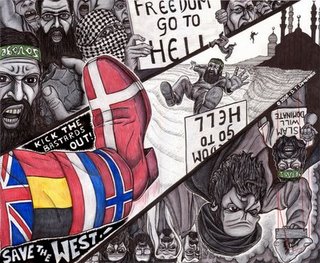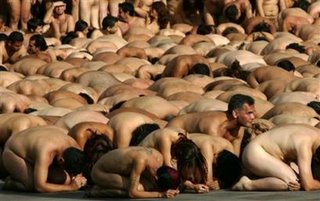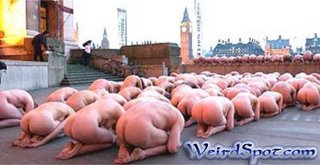
Life's not fair. So what? We don't always get what we deserve, not our rewards, not our punishments. That's life. And so too we see that some people gain at the expense of others when the obvious right and wrong is simply shrugged off as meaningless. What is to be done? Some work to make things better in the face of wrong, others simply continue on hoping nothing worse will happen, and some get on the gravy-train and rip and tear with the worst. It's all living, and we live with it. Victims of genocide, lottery winners, cancer victims, it's all the same. We live and we die and we make the best of our details as we can. That also includes such fundamental outrages as the most obvious evils pushed in our faces. We live with it. We might try to stop the evil but if we don't we must live with it till it kills us, and there's no good reason to complain either way, nature being mindless.
The point to make here is that some people are evil, and that is objective reality, something we live with. How we deal with that is up to us. It is objective that some will do nothing to stop and some will do nothing to aid evil. Life is as it is. And some of us will make it as we wish it to be regardless of others and their passivity. With our competitors we compete and we leave aside the apathy of the middle. That is the nature of nature, that the apathetic and the weak do nothing while the aggressive and the motivated do as they can. The weak and the stupid are material to use, either side using them as they can. That is nature, coherently non-judgeable.
Yale University has a Taliban cretin in its undergrad programme. It's official. Is it morally right to admit a fascist monster to one of our elite universities? No. And so what? The question is one of power, and that is all we can look at at this time. Yale has the power to admit our enemies to its programmes and the power to exclude natives. That is raw power, and that is what we deal with if we are in opposition. We ignore the morality of Yale's position until such time as we have the power to act over them. Yale has done what it has done, and that is the end of that. It is now up to those in opposition to move on and fight for power to undo and to wreck the power Yale has to do such things, regardless of the middle of apathetic people who know or care not. We cannot sit back and await goodness to pour down from the skies. Those who do are doomed. They are drowned, and they have no names. Yale admitted a Taliban terrorist. That is power.
****

The day after the New York Times profile appeared, Haym Benaroya, a professor at Rutgers, wrote to Mr. Shaw expressing disbelief that Mr. Hashemi, who has a fourth-grade education and a high school equivalency certificate, could be at Yale. Mr. Shaw replied that he indeed had "non-traditional roots [and] very little formal education but personal accomplishments that had significant impact." Mr. Benaroya was stupefied; did Mr. Shaw mean accomplishments that had a "positive impact, not terroristic and totalitarian impact"? Mr. Shaw responded: "Correct, and potential to make a positive difference in seeking ways towards peace and democracy. An education is a way toward understanding the complex nuances of world politics."
[....]
Amy Aaland, executive director of Yale's Slifka Center for Jewish Life, where Mr. Hashemi takes his meals (Kosher complies with Islamic dietary laws). When I asked her if any of the revelations about his past disturb her, she noted that he was "very, very young" when he had been a Taliban official, and that "it's not like the Taliban attacked this country." I asked about the Taliban's decree in May 2001 that all non-Muslims--chiefly Hindus--had to wear yellow badges. The order, reminiscent of the Nazis, was met with global censure. A reporter then in Kabul recalls Mr. Hashemi had no trouble defending the decree as a protection for minorities against punishment by the religious police "until I pointed out it also required non-Muslims to move out of housing they shared with Muslims within three days; he didn't have a coherent response to that." Ms. Aaland absorbed all that I told her, and replied: "I don't expect learning to happen overnight." She still thought that "just living here, [Mr. Hashemi] can learn values and ideals from our society."

There is a line beyond which tolerance and political correctness become willful blindness. Eli Muller, a reporter for the Yale Daily News, was stunned back in 2000 when the lies of another Taliban spokesman who visited Yale "went nearly unchallenged." He concluded that the "moral overconfidence of Yale students makes them subject to manipulation by people who are genuinely evil." Today, you can say that about more than just some naïve students. You can add the administrators who abdicated their moral responsibility and admitted Mr. Hashemi. http://www.opinionjournal.com/diary/?id=110008127
****

Yes, some people at Yale are mind-bogglingly stupid, and some are disgustingly evil. We live with that as a fact of life. What is important is power. We have it or we take it or we lose and the others win their agendas. Like it or not.
To a great extent people have power. They might not use it. When they do not, then cliques rule. The cliques now in charge of our daily public lives, the elites of the intelligentsia, are fascists. They have power, we need power to defeat them. Our power wil only come from the people. Without that we wil not rule our own lives.
There are four concepts to come that we need to examine clearly in our look at power. Things are changing, however slowly. We face a paradigm shift in our approaches to epistemology. It seems arcane and even irrelevant at this time, but when the killing fields pile up the bodie we will know ourselves by our epistemologies and little else. We will know who we are by how we approach power, how we force reality to conform to our needs and demands.
Below is the first of four short entries on how we know reality as it pertains to people and culture. If we favor one over the other we find ourselves in one camp or another in this bifurcation of Humanity. We are Modernist Progressives or we are fascist reactionaries. Yes, there is a middle ground, but it's not ground at all, it is the place wherein sink those Primo Levi refers to as "The Drowned."
In the middle of our on-going emotional and intellectual dialectic we are caught with old assumptions about our values and then are vividly confronted with the unreasonableness of same. Our attitudes toward life and people and cultures make no sense in light of reality as we live it. Old attitudes die hard. We do not like to make new ones. We live in a state of comfort, even when that comfort is fatal. Too bad for those who cannot adjust to reality as it is. Social reality has changed, and we will deal with it regardless of whether we do so actively or not.
In the first piece below we look at the concept of and some history of Nativism. Look today to Europe for the sense of it. Compare that to the Cultural Relativism that follows next. We will follow that with a brief look at Triumphalism. Then Multiculturalism, and finally the idea of Social Progress.
This four posts covers a lot of space, and not all of it will be of interest to all readers. We suggest looking over the whole, however cursorily, and that one keep these concepts in mind when viewing unfolding developments in the coming months through till Fall in Europe for the proof that this provides a valid and important base for understanding our new world situation.
The Left dhimmi fascsist phantasies of fools at Yale are today the norm of those who have power. Their ideas were not the norm forever, and they need not last much longer. We can see alternatives. We will act against the norm as it is today or we will face a worse future by allowing the competitors to the mulit-cultural phantasists to continue in power.
First, a look at what is not multi-culturalism. Keep in mind, if you will, the Left fascist leanings of the author of the following piece and see that we need not buy into it.
****
In politics "nativist" refers to the socio-political positions taken up by those who identify themselves as "native-born".
Nativism is a hostile and defensive reaction to the flux of immigration. Though it surfaced first, gained a name and affected politics in mid-19th century United States, recognizably nativist movements have since arisen among the Boers of South Africa, and in the 20th century in Australia and Britain. In American history, nativism was always associated with fears that certain new immigrants might inject political and cultural values at odds with the American way of life.
The term "nativism" is normally applied only to nativists of European stock, and accused by some of being a nationalist element of racism. Similar ideologies espoused by non-Europeans are given other labels and are rarely connected to nativism in public discourse. For instance, while Mexican President Vicente Fox faults the US for not opening its borders, Mexico simultaneously cracks down harshly on "undocumented migrants" who breach her southern borders from other Central American countries. Yet no public discussion accuses Mexico of being nativist in immigration policies. Modern contention over ancient ethnic occupation of areas in Eastern Europe, the Balkans and the Caucasus, sometimes based on tenuous linguistic and place-name hints, is given added urgency by assumptions that an urrecht of the earliest local population can justify nativist stances towards more recent arrivals. These issues are rarely assessed in terms of "nativism".
One such example that has succeeded in asserting their nativist rights, is Zionism. They have based their claim on the territory of Palestine on the Bible and created the state of Israel.
U.S. nativism appeared in the late 1790s in reaction to the political refugees from France and Ireland. After passage of the Alien and Sedition Acts in 1798 it receded. Nativist outbursts occurred in the Northeast from the 1830s to the 1850s, primarily in response to a surge of Irish Catholic immigration. In 1836, Samuel F. B. Morse ran unsuccessfully for Mayor of New York on a Nativist ticket, receiving 1,496 votes. In New York City, an Order of United Americans (OUA) was founded as a nativist fraternity, following the Philadelphia Nativist Riots of the preceding spring and summer, in December, 1844.
In 1849–50 Charles B. Allen founded a secret nativist society called the Order of the Star Spangled Banner in New York as a result of the fear of immigrants. In order to join the Order a man had to be twenty-one, a Protestant, a believer in God, and willing to obey without question the dictates of the order. Members of the Order became known as the Know-Nothings (a label applied to them by newspaper editor Horace Greeley, because no one would admit to knowing anything about the secret society). The Nativists went public in 1854 when they formed the 'American Party', which was anti-Irish Catholic and campaigned for laws to require longer wait time between immigration and naturalization. It is at this time that the term "nativist" first appears, opponents of Americanists denounced them as "biggoted nativists." Former President Millard Fillmore would run on the American Party ticket for the Presidency in 1856. The American Party included many ex-Whigs who rejected nativism, and included (in the South) some Catholics. Conversely, much of the opposition to Catholic and Chinese immigrants came from other immigrants, who can hardly be called "nativists."
This form of nationalism often identified with xenophobia, anti-Catholic sentiment (anti-papism). In the 1840s, small scale riots between Catholics and nativists took place in several American cities. In California, Irish immigrants vented their resentment against the Chinese. Nativist sentiment experienced a revival in the 1880s, led by Protestant Irish immigrants hostile to Catholic immigration. The Chinese Exclusion Act of 1882 was the first of many nativist acts of congress to limit the flow of immigrants into the U.S. The Orange Order was the center of nativism in Canada from the 1860s to 1950s. The second Ku Klux Klan, which flourished in the U.S. and Canada in the 1920s, used strong nativist rhetoric. In 1928, nativist bias was an important feature of the defeat of Presidential candidate, Alfred E. Smith, a Catholic. During World War II, 'nativist' undercurrents fueled the Japanese American Internment.
American nativist sentiment experienced a resurgence in the late 20th century, this time directed at 'illegal aliens,' largely Mexican resulting in the passage of new penalties against illegal immigration in 1996. After terrorist attacks in New York City and Washington, D.C. in 2001, nativist feeling and islamophobia were amplified and directed increasingly toward individuals perceived to be either Arab and/or Muslim; these found themselves the target of rhetoric and a request by nativists to tighten border controls. The early 21st-century American movement that is self-characterized as "Immigration reduction" attempts to distance itself from any suggestion of Nativist motivations.
http://en.wikipedia.org/wiki
****
It likely strikes many as obvious that there is a conflation of nativism and racism. I beg to spit on such a thought. Such reductionism is typical of the stupidity of many on our so-called intellectuals. The KKK is not America; the BNP is not Britain; the FN is not France. The IRA is not Muslim. Should the Irish, as one example, make consessions to Muslims in Ireland by way of sharia in Ireland? Are the Irish, if they do not concede sharia privilege to the Muslim community in Ireland, nativist and racist? And if one argues such, does it really make any difference?
The only argument for or against sharia privilege in Ireland is who has power. Any other argument is naive and sentimental. There is one rule: "All political power grows out of the barrel of a gun."
The Islamic umma is at war against the world at large. It is between the natives and the Muslims. No, Islam is not monolithic, and no, not every Muslim is violent; but yes, it only takes a small number of dedicated people to rule. We are for ourselves in opposition to Islam or we are on our way to Islam and dhimitude. It's not fair. We should all just get along and live in peace and harmony. In the real world there are real people who are our enemies. They might win. It is a matter of power.



2 comments:
I also have been reading and hearing from John Fund about the Yale Taliban. The whole story is incredible. He was not just an enemy sympathizer; he was actually the enemy and may still be the enemy. He is lucky he did not end up dead or in Guatanamo. He should be thrown out of Yale and thrown out of the country forthwith.
It is hard to believe that no politican from Connecticut, where Yale is, has got on this case.
This gives a whole new meaning to "New Haven."
Yale, and so many other of our public institutions, is a haven for the morally insane. It has to stop. And according to me, there is no reason to expect others to make it stop: we act on our own as individuals united with other individuals to change our societies. The morally insane are not wourth considering in this or any other debate.
Felix, I'm happy to see you again.
Post a Comment